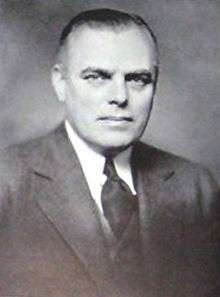Howard Deering Johnson
Howard Deering Johnson (February 2, 1897 – June 20, 1972) was an American entrepreneur, businessman, and the founder of an American chain of restaurants and motels under one company of the same name, Howard Johnson's.
Howard Deering Johnson | |
|---|---|
 | |
| Born | February 2, 1897 Boston, Massachusetts, US |
| Died | June 20, 1972 (aged 75) |
| Nationality | American |
| Occupation | Entrepreneur Hospitality industry executive |
| Employer | Howard Johnson's |
Early life
Howard Johnson was born in Boston, Massachusetts, and only finished elementary school because he began to work in his father's cigar business. He served during World War I in the American Expeditionary Force in France. His father died and left him a business that was in debt. He ran the cigar store until 1924, when he liquidated it, but he could not erase the US$10,000 debt. He entered the restaurant industry in order to pay off what remained after he sold the cigar venture.[1]
In 1925, he bought a small soda shop in the Wollaston neighborhood of Quincy, Massachusetts. He enhanced the quality of the ice cream by buying a recipe from a pushcart vendor for $300. It doubled the butterfat of the product and used only natural flavorings. He used hand-cranked makers in his basement and by 1928 was grossing about $240,000 from ice cream sold in the store and nearby beaches.[2]
Johnson expanded operations by opening more stores and started selling food items such as hamburgers and frankfurters at his original store. In 1929, he opened a second restaurant in Quincy. This sit-down outlet had a broader menu and laid the groundwork for future expansion.
In 1935, Howard Johnson teamed up with a local businessman, Reginald Sprague, and created the first modern restaurant franchise. The idea was new in that day: let an operator use the name, food, supplies, and logo, in exchange for a fee. The business of "HoJo" chain restaurants rapidly expanded and he also entered the lodging industry.
Howard Johnson had his two children also begin working in the business. His son Howard Brennan Johnson and daughter Dorothy Johnson beamed down together from highway billboards proclaiming that "We love our daddy's ice cream" at the time when they were six and eight years old respectively.[3]
Later life
Johnson was married four times, siring at least two children. He had a 60-foot (18 m) yacht and collected paintings. His hobby was "to talk and eat food." His favorite food was ice cream, which he stoutly — he was 205 pounds (93 kg) — maintained was "not fattening." He ate at least a cone a day, and he kept 10 distinct flavors in the freezers of his seven-room Manhattan penthouse and at his home in Milton, Massachusetts.[4]
He recalled that he had no interest or time for anything but building his business. "I think that [building the business] was my only form of recreation," Joseph H. Boyett quoted him as having said in The Guru Guide to Entrepreneurship: A Concise Guide to the Best Ideas from the World's Top Entrepreneurs, which was published in 2001. "I never played golf. I never played tennis. I never did anything after I left school. I ate, slept, and thought of nothing but the business."[5]
.jpg)
Johnson retired in 1959, leaving the company to his son, Howard Brennan ("Bud") Johnson. The older Johnson continued to monitor his restaurants for cleanliness and proper food preparation. He would be chauffeured in a black Cadillac bearing the license plate HJ-28 (his initials and 28 ice cream flavors) while performing unannounced inspections of the restaurants.[4]
Johnson died on June 20, 1972, at the age of 75.[6] He was buried in Milton Cemetery in Milton, Massachusetts.
Legacy
His contribution to the restaurant industry was the idea of centralized buying and a commissary system to prepare menu items for distribution to his restaurants. This helped to insure a uniform consistency and quality, as well as lower costs. His company was at one time the largest commercial food supplier in the United States.
In 1999, Johnson was inducted to the Hospitality Industry Hall of Honor, which recognizes the world’s most successful hospitality interests and most recognizable brands.[7]
References
- Boyett, Joseph H. (2001) The Guru Guide to Entrepreneurship: A Concise Guide to the Best Ideas from the World's Top Entrepreneurs, John Wiley and Sons, p. 274.
- Boyett, Joseph H. (2001) The Guru Guide to Entrepreneurship: A Concise Guide to the Best Ideas from the World's Top Entrepreneurs, John Wiley and Sons, p. 275.
- "Personalities", Time, 3 April 1964, retrieved on October 19, 2007.
- http://content.time.com/time/magazine/article/0,9171,826595,00.html "Host of the Highways"], Time, 5 September 1960. Retrieved October 19, 2007.
- Boyett, Joseph H. (2001) The Guru Guide to Entrepreneurship: A Concise Guide to the Best Ideas from the World's Top Entrepreneurs, John Wiley and Sons, p. 24.
- Cafe chain owner Howard Johnson dies
- Howard Dearing Johnson Archived 2007-07-10 at the Wayback Machine at the Conrad N. Hilton College at the University of Houston, retrieved on October 19, 2007.
Further reading
- Crandall, William “Rick”; Ziemnowicz, Christopher; Parnell, John A. (November 2005). "The Growth and Demise of the Howard Johnson's Restaurant Chain: a Schumpeterian Perspective". Proceedings of the Southern Management Association Meeting.
- Miller, Brian (2005). "Howard Johnson: The man under the orange roof". Journal of Hospitality and Tourism Education. 17 (4): 5–8.
- Sammarco, Anthony Mitchell (2013). A History of Howard Johnson's: How a Massachusetts Soda Fountain Became an American Icon. The History Press. ISBN 9781609494285.